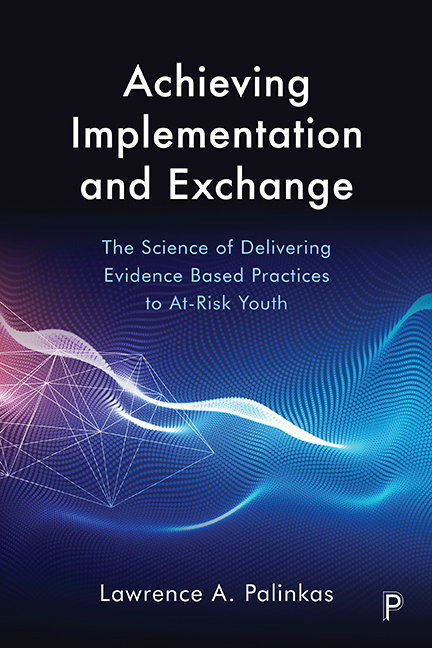 Achieving Implementation and Exchange
Achieving Implementation and Exchange Book contents
- Frontmatter
- Dedication
- Contents
- Tables and figures
- Abbreviations
- Preface
- 1 Introduction
- 2 The need for evidence-based practice
- 3 Understanding and reducing the gap
- 4 EBP implementation in child welfare and child mental health
- 5 Social networks and EBP implementation
- 6 Use of research evidence and EBP implementation
- 7 Local models of EBP implementation
- 8 Research–practice–policy partnerships
- 9 Cultural exchange and EBP implementation
- 10 A transactional model of implementing EBP
- References
- Index
9 - Cultural exchange and EBP implementation
Published online by Cambridge University Press: 13 April 2022
- Frontmatter
- Dedication
- Contents
- Tables and figures
- Abbreviations
- Preface
- 1 Introduction
- 2 The need for evidence-based practice
- 3 Understanding and reducing the gap
- 4 EBP implementation in child welfare and child mental health
- 5 Social networks and EBP implementation
- 6 Use of research evidence and EBP implementation
- 7 Local models of EBP implementation
- 8 Research–practice–policy partnerships
- 9 Cultural exchange and EBP implementation
- 10 A transactional model of implementing EBP
- References
- Index
Summary
I think that in the community mental health sectors, so many of the clients we serve have multiple diagnoses, multiple problems, multiple risk factors and so much of the research seems focused on more single diagnoses, single risk factors, so I continue to think that it's important for researchers to do what they’re doing but continue this trend of moving towards real-world situations and trying to find alternative methods of researching in real-world environments, or else the gulf between researchers and practitioners will continue. Practitioners will get research that is too removed from the clientele that they serve and just not be that impressed with it, and vice versa. I know researchers who view practitioners as not caring just one way or another about actual evidence will get frustrated. So I think there has been some great experience now with the federal system of care grants that have gone out and some of the other grant making processes where folks are learning more about how to do research and what outcomes are like and make it applicable to folks on the front line working in real community-based clinics. (Mental health services director)
Conceptual models of evidence use in policy and practice acknowledge that the URE to make or support decisions is often a collective and interactive endeavor rather than an activity performed by any one individual decision maker (Traynor et al, 2014; Edelstein, 2016). This collective endeavor involves the utilization of social capital (Spillane et al, 2001; Honig and Coburn, 2008), social networks (Foster-Fishman et al, 2001; Valente et al, 2015), a common language (Kothari et al, 2011), and the exchange of knowledge or information between researchers and practitioners and within networks of practitioners (Lomas, 2000; Mitton et al, 2007; Nutley et al, 2007).
As illustrated by the three case studies presented in the last chapter, the extent of collaboration between researchers and practitioners is often dependent upon the willingness and ability to exchange information and values through their interactions. This exchange is consistent with a conceptual model of evidence use in which decision makers are human information processors who interact with the evidence, interpret its meaning, and hence determine whether and how they will permit the evidence to influence them (Kennedy, 1984).
- Type
- Chapter
- Information
- Achieving Implementation and ExchangeThe Science of Delivering Evidence-Based Practices to At-Risk Youth, pp. 169 - 188Publisher: Bristol University PressPrint publication year: 2018


